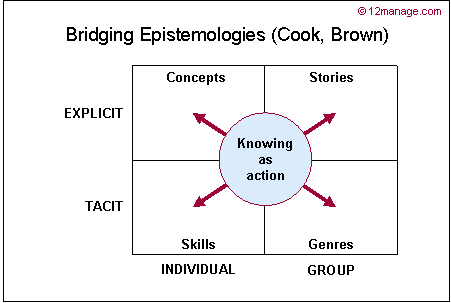What is the Bridging Epistemologies framework?

S.D.N. Cook and J.S. Brown argue that much current work on organizational
knowledge, intellectual capital, knowledge-creating organizations, knowledge
work and the like is based on a single, traditional understanding of the nature
of knowledge. In this "epistemology of possession," knowledge is treated
like something which people possess. Yet, this vision can not account for
the knowing which is found in individual and group practice.
Knowing as action calls for an "epistemology of practice." Moreover,
the epistemology of possession tends to privilege explicit over tacit knowledge.
Also it tends to privilege individual knowledge over group knowledge.
Current work on organizations is limited by this privileging, and by the
scant attention given to knowing. Organizations are better understood if explicit,
tacit, individual and group knowledge are treated as four distinct and coequal
forms of knowledge. Each is doing work the others can't. Knowledge and knowing
should be seen like mutually enabling; not like competing.
Actions by collectives cannot be reduced to only the actions of individuals
within them. Cook and Brown identify 4 types of knowledge: explicit and tacit
at the individual and collective levels, and consider how they are bridged
by the active process of knowing (OUBS,2001). The process by which different
knowledge types are used in practice is described as a "generative dance".
According to this metaphor, knowledge creation does not simply rely on an
inventory of knowledge elements (possession), but on the ability to
use those as tools (action).
Cook and Brown hold that knowledge is a tool of knowing, that knowing is
an aspect of our interaction with the social and physical world, and that
the interplay of knowledge and knowing can generate new knowledge and new
ways of knowing.
Origin of the Bridging Epistemologies model. History
The model from Cook and Brown developed from:
- Polanyi's distinction between tacit and explicit knowledge (1983). Tacit
knowledge is what is not easily visible and expressible. Tacit knowledge
is personal, context specific and hard to formalize and communicate. Subjective
insights, intuitions and hunches fall in this category, which includes cognitive
and technical elements. Explicit knowledge can be expressed in words and
numbers and can be easily communicated and shared in the form of hard data,
scientific formulae, codified procedures and universal principles. (Nonaka
and Takeuchi).
- Spender's epistemological pluralism (1998): (1) objective knowledge
is only one way of knowing things, and (2) some aspects of explicit and
tacit knowledge are only known collectively (see also Blackler, 1995).
It adds a dynamic element of knowledge and opposes the traditional knowledge-as-assets
or resource view of knowledge. This model resembles the view of Nonaka and
Takeuchi in their SECI model, which sees knowledge creation as a transformation
of the various knowledge elements.
Usage of the Bridging Epistemologies framework. Applications
The framework Cook and Brown helps to think of knowledge in an organizational
context and understanding why and how we know things collectively. Their model
strengthens the link between product and process innovation. In their view,
forms of knowledge distributed among individuals and groups are not the only
essential for product development; ways of "knowing" reflected in the interaction
of the workers with each other and their objects of work are also essential
(OUBS,2001).
An example of the Bridging Epistemologies model
The model is illustrated using the simple example of a bakery: Relevant
tools are:
- Knowledge as concepts. Theory known by individuals, like which flour
to use, how much salt to use etc.
- Skills. The ability to make bread
- Stories. How things were built up
- Genre. The context of the bakery
An apprentice can learn or be part of all these elements, he or she will
need experience in order to make bread: knowledge as action.
Assumptions of the Bridging Epistemologies model. Conditions
- Knowledge can not be transformed from its various forms (individual/tacit
etc.), but exist in distinct forms.
Article: Cook and
Brown - Bridging Epistemologies.
|
Forum discussions about Bridging Epistemologies.
|
🔥
|
Tacit Knowledge and Experience Transfer
A large part of a person´s unique expertise is by nature, tacit. Tacit knowledge is also known as personal knowledge, which gradually has become a part of the skilled worker. These qualities are rarel...
 3 |
|
|
|
Courses about Bridging Epistemologies.

Beginners Course
|

Advanced Course
|

Course for Experts
|
|
|
|
The best, top-rated topics about Bridging Epistemologies. Here you will find the most valuable ideas and practical suggestions.
|
|
|
Advanced insights about Bridging Epistemologies. Here you will find professional advices by experts.

Consultancy Tips
|

Teaching Tips
|

Practical Implementation Tips
|
|
|

|
Barriers that Hinder Effective Knowledge Sharing Effective Knowledge Sharing, Pitfalls to Avoid, Knowledge Management Implementation
According to Chris Collison, there are seven common barriers or syndromes that hinder effective knowledge sharing and se...
|

|
Positive Effects of Age Diversity on Company Productivity and (Tacit) Knowledge Sharing Tacit Knowledge Transfer, Workforce Productivity, Incentive Management
Backes-Gellner and Veen (2013) outlined the main advantages of having a diverse workforce within a company. The followin...
|

|
How to Identify and Map Knowledge Knowledge Identification, Knowledge Capturing, Knowledge Storage
In his article “Knowledge Mapping: The Essentials for Success”, Wesley Vestal provides following six tips to identify an...
|

|
Critical Activities to Build a Learning Organization Implementing Organizational Learning, Best Practices
Learning organizations are distinguished because they are undertaking certain activities to foster the internal learning...
|

|
Capturing Learned Lessons How to Capture Organizational Learning? Best Practices
Knowledge from bad and good experiences will lead you and your organization to better future performance. You can improv...
|

|
How Culture Levels Explain Failures in Organizational Learning and Innovation Improving Organizational Learning, Organizational Innovation, Changing Organization Cultures
Schein (as cited by Bertagni et al., 2010) tries to elaborate on the question why organizational innovations often fail ...
|

|
Knowledge Management Scope Knowledge Management, Level of Know-how
Research by Deishin Lee (HBS) and Eric Van den Steen (MIT) shows that recording mediocre know-how can actually be counte...
|

|
Components of Learning Agility Organizational Agility, Organizational Learning, Knowledge Management
One of the critical factors for achieving organizational agility is learning agility, which refers to the ability and ea...
|

|
Knowledge Management Focal Point Knowledge Management Focus
Research by Deishin Lee (HBS) and Eric Van den Steen (MIT) shows that information about successes is typically more usef...
|
|
|
|
Various sources of information regarding Bridging Epistemologies. Here you will find powerpoints, videos, news, etc. to use in your own lectures and workshops.

|
How to Improve Knowledge Sharing in Knowledge-intensive Organizations Knowledge Management, Knowledge Sharing Motivation, Knowledge Sharing Platform. Tacit Knowledge
This presentation elaborates on the concept of knowledge sharing, thereby focusin on a knowledge-intensive organization ...
|

|
Overview of Existing Types of Knowledge Knowledge Management, Knowledge Types, Tacit, Implicit, Explicit, Declarative, Procedural Knowledge
This presentation provides an overview of the different types of knowledge that exist. The presentation includes the fol...
|

|
Knowledge Management Systems Architecture Knowledge Management, Knowledge Creation, Knowledge Systems, Knowledge Architecture
This presentation is about knowledge development and management, including the following sections:
1. Overview
2. Know...
|

|
Introduction to Knowledge Management: Foundation Principles and Building Concepts Knowledge Management, Knowledge Sharing, Learning Organization
1. What is Knowledge?
1. What is Knowledge Management? Definition
2. Knowledge Foundation Principles and Building Conc...
|

|
How to Integrate Internal Organizational Knowledge with External Online Communities Knowledge Management, Knowledge Creation, Knowledge Sharing, Interaction, Knowledge in Organizations
Due to many online and web-based technological developments in today´s digital economy, sharing knowledge in online comm...
|

|
Three Levels of Knowledge Management Initial Understanding Knowledge Management, Organizational Learning
According to Jury (2007), knowledge management can be categorized into three different levels, and organized in a pyrami...
|

|
Knowledge Sharing and Organizational Learning through Communities of Practices Knowledge Sharing, Organizational Learning, Communities of Practices, Special Interest Groups
Knowledge management in Communities of Practice (CoPs)
This presentation is about organizational learning and knowledge...
|

|
Knowledge Creation: The SECI Model Knowledge Management, Knowledge Creation
Presentation about the SECI model of Nonaka and Takeuchi (1996), a model about knowledge creation. The model is based on...
|

|
Knowledge Transfer and Knowledge Sharing Knowledge Management, Knowledge Sharing, Knowledge Transfer
Preentation that is an introduction into the concept of Knowledge Transfer, including its fundamentals, strategies, guid...
|

|
Professor Evans Explains Why Fast Change Requires New Ways of Learning and Thinking Action Learning, Coping with Change, The Need of Change, The Need for New Ways of Learning
In this historic video Action Learning Professor Reg Evans shows that it is very important to understand that today's ra...
|

|
Knowledge Transfer in the E-world Knowledge Management, Knowledge Transfer, Internet, Intranet, E-Business, CRM
This is a presentation about Knowledge Transfer (KT), specifically focused on KT in the e-world. The presentation consis...
|

|
Bridging Epistemologies Diagram Knowledge Management
Download and edit this 12manage PowerPoint graphic for limited personal, educational and business use.
Republishing in ...
|
|
|
|
Useful tools regarding Bridging Epistemologies.

News
|

Videos
|

Presentations
|
| |

Books
|

Academic
|

More
|
|
|
|
Compare with Bridging Epistemologies:
SECI model |
Organizational Learning
| Organizational
Memory | Action
Learning |
Knowledge Management
(Collison & Parcell)
Return to Management Hub: Change & Organization | Human
Resources | Knowledge & Intangibles
More Management Methods, Models and Theory
|
|
|














